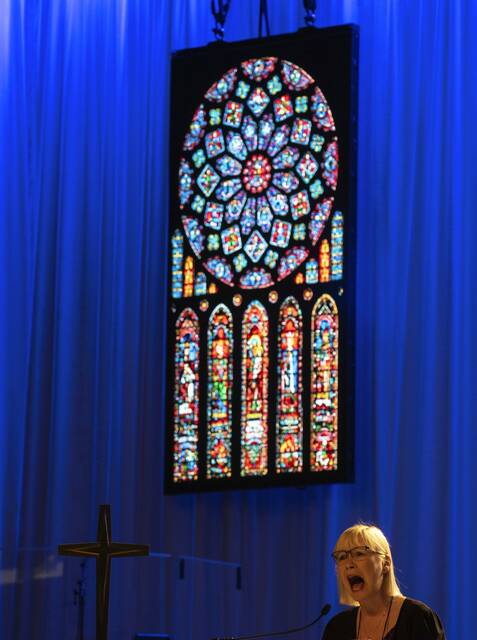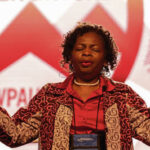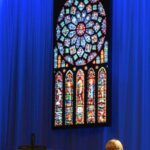ERIE — As a fourth-generation United Methodist and pastor’s daughter, Bishop Cynthia Moore-Koikoi’s roots in her faith run deep.
Presiding over the disaffiliation of more than a third of the congregations from the United Methodist Church’s Western Pennsylvania Conference was personal.
“It’s friends, family, persons that were formerly part of my cabinet that are leaving,” she said. “Churches that I’ve preached in, churches that I’ve gone to their apple dumpling festival and been a part of their ministry, we’ve worked alongside each other in mission work. … There are some personal relationships that will be different now. I’m hoping that we still will be in a relationship, but it will be different.”
Last week, 298 churches out of the 766 in the Western Pennsylvania Conference finalized their departure from the group at its annual meeting in Erie. The local breakaway is part of a national trend that’s expected to continue, with disaffiliations closing in on 4,000 and expected to rise even more by the end of the year.
The United Methodist Church — with about 6.5 million members in the U.S. and at least that many abroad — has long debated its bans on same-sex marriages and the ordination of openly LGBTQ clergy. The denomination has repeatedly upheld the bans, largely through the voting strength of the growing, more conservative churches abroad. But many conservatives are choosing to form new denominations amid growing defiance of the bans in U.S. churches.
More than 3,500 U.S. congregations have received their local conferences’ permission to disaffiliate from the UMC, according to United Methodist News Service. Some congregations will join the more conservative Global Methodist Church, formed in 2022, while others will join other denominations or become nondenominational.
Moore-Koikoi described the move as a “moment of sorrow.”
“It has become real now, that we are separating, and there are churches that are actually going to disaffiliate,” she said. “It does bring some pain. These are folks that we have journeyed with, and shared deep faith conversations. We’ve been together through their times of sorrow, and their times of joy together, and so it is a little painful to think that that journey in this way has come to an end.”
Moore-Koikoi said she was already looking ahead — to the future of the conference after disaffiliation, to the healing process and to the work to come.
“We have a wonderful opportunity to think about how we can do church in new ways, how we can reach folks we haven’t been able to reach before, and how we can revitalize congregations now that they’ve made the commitment to be United Methodist,” she said. “We’ll need to make sure that we are intentional about providing space and time for (the) grief process. Then, to use this opportunity to see what the next thing is God wants us to focus on.”
Mission of the church
During the conference, volunteers with UMCOR, the United Methodist Committee on Relief, were hard at work packing care packages and cleaning buckets full of emergency supplies.
Deaconess Katie Peterson of Grace United Methodist Ministry in New Castle instructed volunteers on what to put in each bucket and explained how the supplies would help others. The buckets have been sent to people in crisis, including to East Palestine, Ohio, after the recent rail disaster.
“In my six and a half years here, we have sent over 6,000 cleaning buckets around to all of Western Pennsylvania because of flash floods,” Peterson said. “You never know if it’s a little tiny community or if it’s a great big community that gets it.”
The disaffiliation will mean a decrease in the number of people in the region who call themselves United Methodist, as 39% of all churches are leaving. Despite this, Peterson doesn’t expect there to be a huge impact on participation in the relief mission group.
“I’m actually seeing an increase (in interest),” she said. “Other churches, they didn’t know about the denomination splitting. Non-United Methodist churches are coming, but we also have reached out to the churches that have left, and said, ‘We’re here for you.’ ”
Lynne Delaney of Grace United Methodist Church in Oil City has a particularly personal relationship with the group’s work. After volunteering to put together care packages in the past, she was a recipient of one herself in 2019 when her town was damaged by flooding.
“I am mission-minded, and just knowing that I am helping somebody that really, truly needs some help, I may not know them, but God knows them, and that’s all that matters,” she said.
Delaney herself is disaffiliating from the United Methodist Church, though her home church voted to stay United Methodist. She intends to seek out a new congregation that is part of the Global Methodist Church, she said.
“I am going with Global Methodist, and they will have some kind of program that I’m hoping will take this,” she said. “If not, I will still supply for UMCOR for the buckets.”
Reconciling ministries
An eclectic group of delegates, family members and congregants displayed colorful pride flags and rainbow-patterned T-shirts and accessories gathered around a firepit along the bank of Lake Erie outside the conference.
Members of the Reconciling Ministries Network, a group within the United Methodist faith, commit “to achieving LGBTQ+ justice and full inclusion in the life and leadership of the United Methodist Church, both in policy and in practice,” according to its website.
While the church cannot perform or host same-sex marriages or ordain LGBTQ+ individuals at this time, Reconciling Ministries members try to provide a welcoming environment for those people and their allies. At the conference, the group held a Communion service and prayed, emphasizing that “there is room for all” in the church.
“It’s working to help churches learn what it means to really affirm their queer siblings, neighbors and family members,” said Michael Airgood, who serves Glassport United Methodist Church and Pine Run United Methodist Church and is co-chair of the group. “We’ve had this idea that if you tolerate, that’s enough, but we’re not there, we want the full embrace. We don’t want the crumbs, we are inviting people to the table.”
Despite the tension around the disaffiliation, Airgood, who is an out queer pastor, looks ahead to the future. The Reconciling Ministries movement has worked in recent years to educate United Methodists about LGBTQ+ issues and how to be welcoming, he said.
“The church I grew up in, where I preached my first sermon, the first church I served all left,” Airgood said. “It’s hard, that there was misinformation, disinformation, there was some tension. But I also think there is some sense of relief, that we have freed each other to do ministry the way we think it needs to be done.”
Talk about disaffiliation also has led some new United Methodist congregation members to discover the Reconciling Ministries group, he said.
“We’ve found a lot of folks who were really surprised that their church wasn’t affirming, that their church didn’t support their grandson, their cousin, their spouse, them,” he said. “We’ve found a lot of folks who have found a new embrace, a new church where they really are welcome fully. We’ve also just found some more energy in some things.”
The Rev. Kelly Smith, pastor at Monroeville United Methodist Church, attended the Reconciling Ministries meeting with her two children. Making it to the other side of the disaffiliation vote has given her some hope, she said.
“I feel like there’s a new future, and I’m hopeful and optimistic that we will live into a new world, where all God’s children are included,” she said. “My church is a fully inclusive church, and I’m trying to teach my kids that, too.” ”
The road ahead
The realities of losing a chunk of churches have been a part of the planning process since the official path to disaffiliation was formalized back in 2019, Moore-Koikoi said. The conference has talked about ways to manage funds for the past several years, although the future of individual church buildings is unclear.
“It is true, when you have about a third of your churches leave, you have to make that adjustment to the budget,” she said. “The reality, though, is that because a third of our churches are leaving, we will not need a third of our structure that we once had, that we had to support. There are fewer expenses.”
She is hopeful that the way that the conference has handled the process will allow people to maintain connections to one another, even if they have disaffiliated.
“We have always been a denomination that has ecumenical relationships and also interfaith relationships,” she said. “I am convinced we’ll continue to work with folks who have the same understanding about how God wants us to be in the world, to bring relief to folks, to work on issues of justice. I think we’ll continue to have those relationships. I’m hoping that the way we have handled things around disaffiliation will open the door for that.”





















